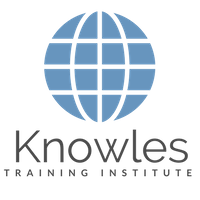Soft Skills Course in Singapore
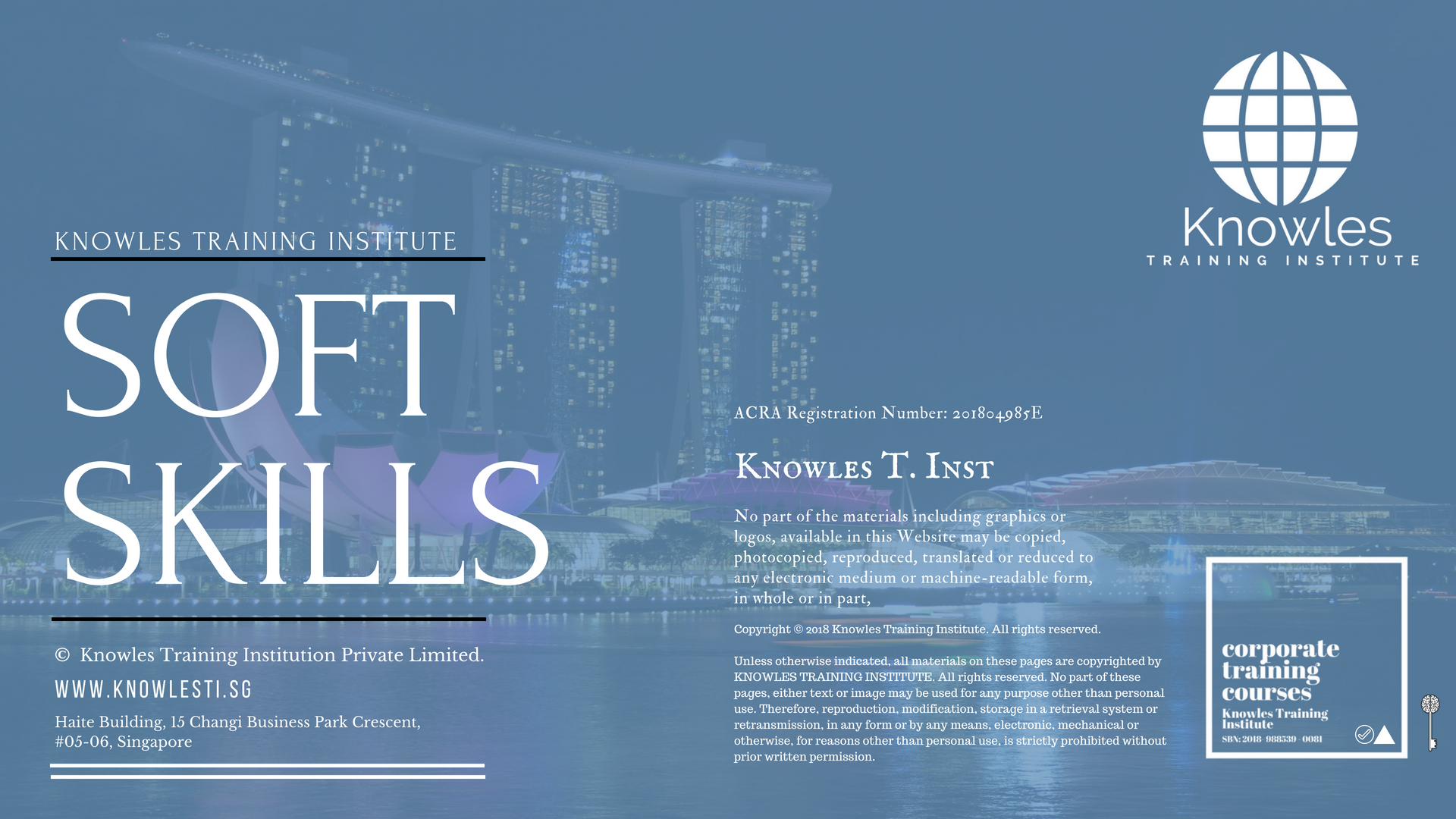
About This Soft Skills Training Course
Soft Skills Course in Singapore
Soft skills can be defined as personal attributes or competencies that enable one to interact harmoniously and effectively with other people. When you have these skills, you are bound to succeed in your work. They can also be called people skills. They are quite different from the hard skills that are directly relevant to the job you do.
No matter the job you do, you need some soft skills. You need to get along with other people who you interact with, including co-workers, vendors, customers, and managers. Employers want candidates who can interact with others effectively. Since the skills are difficult to teach, employers want to know that the candidates already have these skills.
Ideally, soft skills are a combination of social skills, people skills, personality traits, career attributes, emotional intelligence, and communication skills. With these skills, you can easily navigate your working environment, perform well, and achieve your goals as you complement hard skills.
One’s soft skills are a useful part of their personal contribution to the success of the organisation. Organisations that deal with their customers face-to-face can become more successful if they promote activities for employees to develop soft skills. Rewarding for personal habits or training can yield a considerable return on investment for any given organisation. This explains why soft skills are sought out by all employers.
Course Schedule
| COURSES | DATES | TIME | VENUE | COUNTRY | REGISTRATION |
|---|---|---|---|---|---|
| Soft Skills Course | 27 May, 2024 - 28 May, 2024 | 9 am to 5 pm | Online / Face to Face | Singapore | |
| Soft Skills Course | 27 June, 2024 - 28 June, 2024 | 9 am to 5 pm | Online / Face to Face | Singapore | |
| Soft Skills Course | 27 July, 2024 - 28 July, 2024 | 9 am to 5 pm | Online / Face to Face | Singapore | |
| Soft Skills Course | 27 August, 2024 - 28 August, 2024 | 9 am to 5 pm | Online / Face to Face | Singapore | |
| Soft Skills Course | 25 September, 2024 - 26 September, 2024 | 9 am to 5 pm | Online / Face to Face | Singapore | |
| Soft Skills Course | 25 October, 2024 - 26 October, 2024 | 9 am to 5 pm | Online / Face to Face | Singapore | |
| Soft Skills Course | 25 November, 2024 - 26 November, 2024 | 9 am to 5 pm | Online / Face to Face | Singapore | |
| Soft Skills Course | 26 December, 2024 - 27 December, 2024 | 9 am to 5 pm | Online / Face to Face | Singapore |
Who Should Attend This Soft Skills Workshop
This Soft Skills workshop is ideal for anyone who would like to gain a strong grasp and improve their Soft Skills.
All Staff Within An Organisation
Managers
Team Leaders
Executives
Assistants
Officers
Secretaries
Group Size For This Soft Skills Training Program
The ideal group size for this Soft Skills course is:
Minimum: 5 Participants
Maximum: 15 Participants
Course Duration For This Soft Skills Course
The duration of this Soft Skills workshop is 2 full days. Knowles Training Institute will also be able to contextualised this workshop according to different durations; 3 full days, 1 day, half day, 90 minutes and 60 minutes.
2 Full Days
9 a.m to 5 p.m
Soft Skills Course Benefits
Below is the list of course benefits of our Soft Skills course
- Start communicating effectively
- Have strong leadership qualities
- Improve your problem solving skills
- Enhanced critical and creative thinking
- Better teamwork
- Improved productivity
Soft Skills Course Objectives
Below is the list of course objectives of our Soft Skills course
- Become more effective leader and communicator
- Know how to build loyalty and trust within the team you are working with
- Have the capability to motivate your team and inspire them in hectic and difficult situations
- Know how to handle conflict in tough conditions
- Understand and appreciate the differences between management and leadership
- Be in a position to project a dynamic image in your organisation
- Assess your leadership behaviour and develop a leadership style that suits your team
- Identify the various skills needed for one to become an effective leader
- Improve your listening skills to respond to needs of different constituents in the workplace settings
- Understand strategies and tools for engaging in great business interactions
- Know how to incorporate the right practices for presentations, use of visuals to enhance your storytelling
- Enhance and custom verbal, non-verbal, and written communication in the workplace audiences, including clients, teammates, and managers.
Course Content For This Soft Skills Training Course
Below is the list of course content of our Soft Skills training course
- How to effectively build professional relationships and communicate through written, non-verbal, and face-to-face communication
- Learn essential collaboration and teamwork skills to build, lead, and motivate teams in the workplace
- Using techniques to assess the environment, design a solution, and assess the environment, and win a competitive scenario
- Learn how to create narratives and messages that can resonate with the target audience and create a desired outcome
- Build confidence as a speaker and know how to use simple skills and tools to deliver memorable presentations
- Know how impactful images can enhance presentation, communication, and also messaging to impress the audience
- Various practices for carrying out strategic analysis of the problem in the workplace
- Set your personal goals and identify weaknesses and strengths
- Maintaining a healthy lifestyle and work-life balance
- How to interpret and analyse information received
Soft Skills Value Added Materials
Each participant will receive the following materials for the Soft Skills course
Soft Skills Learner’s Guide
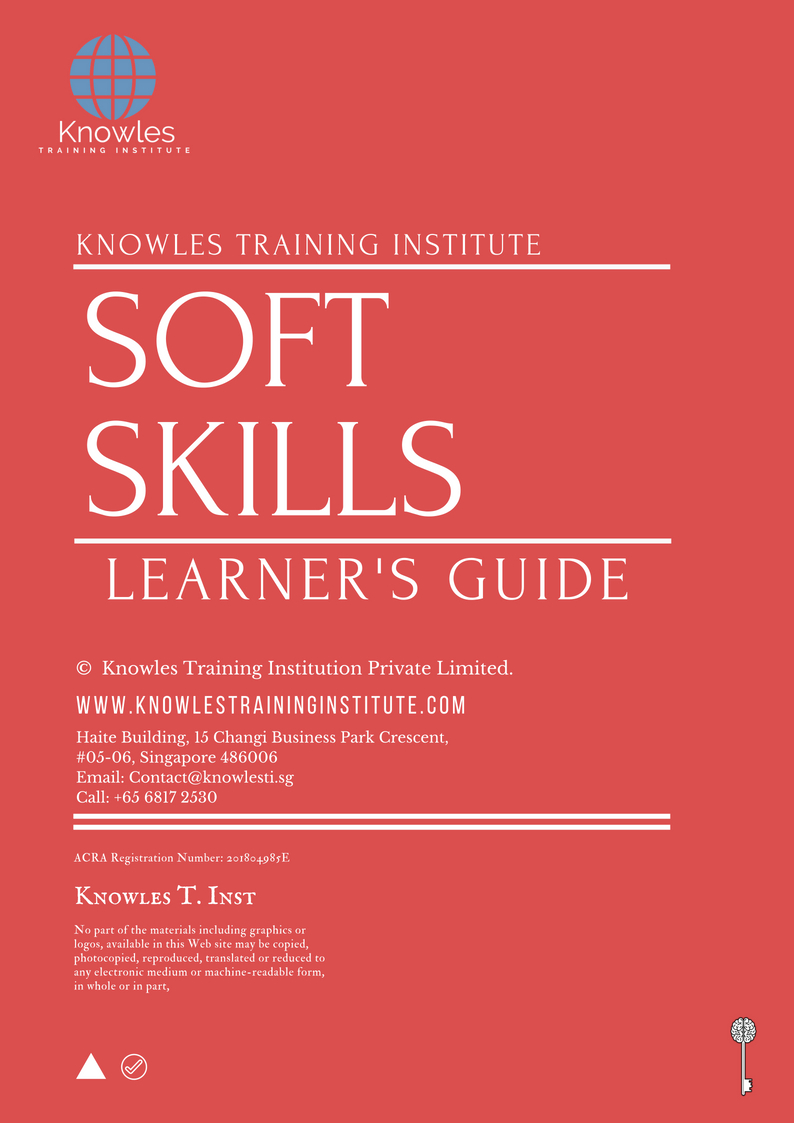
Soft Skills Key Takeaways Notes
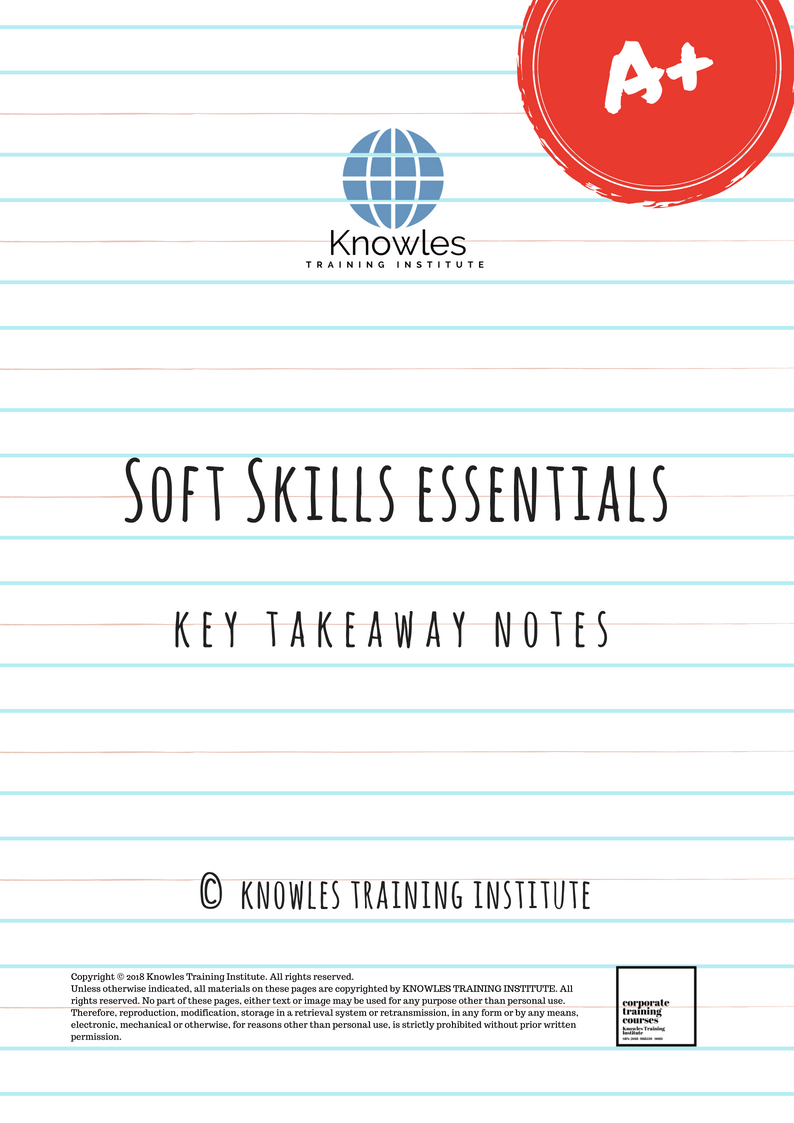
Soft Skills Essentials Ebook
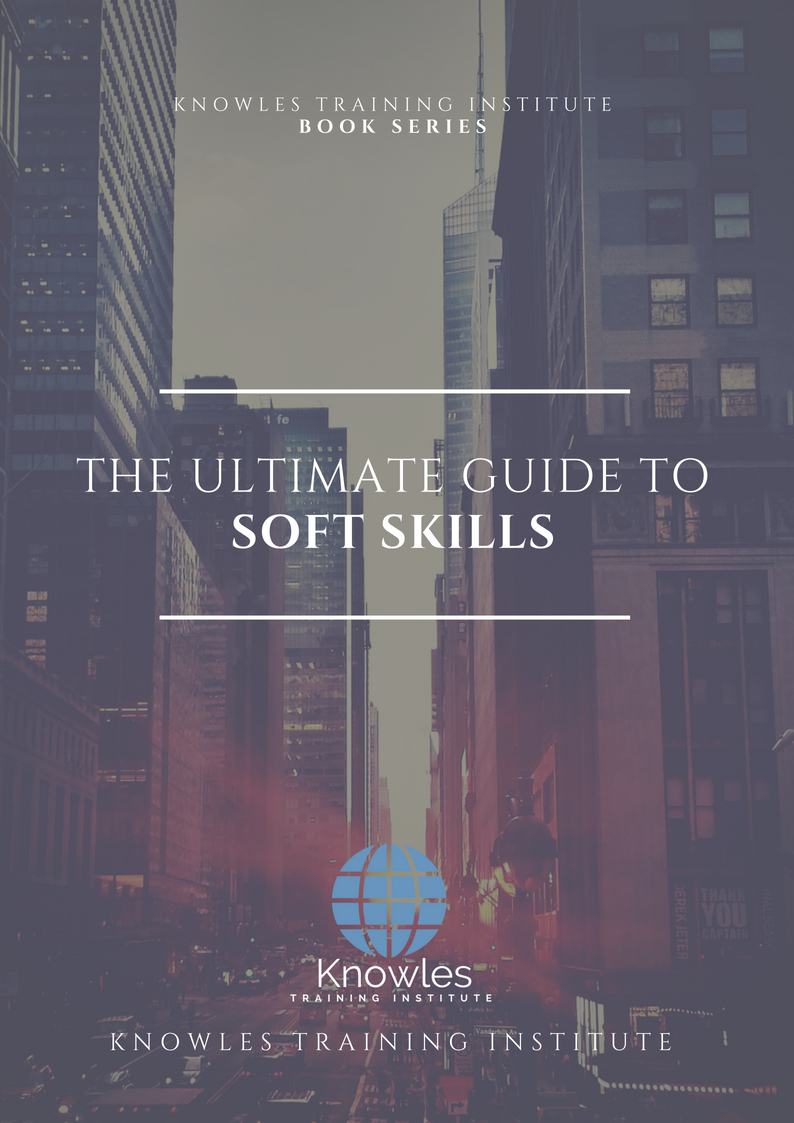
Soft Skills Course Handouts
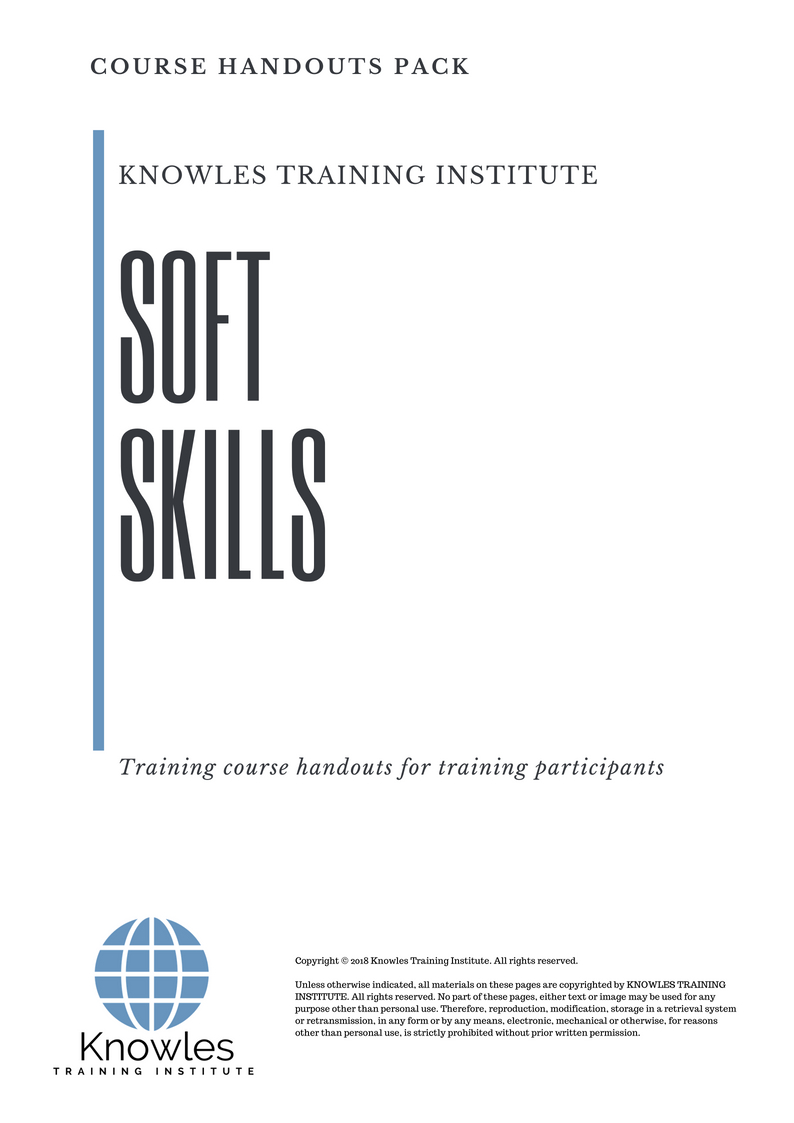
Soft Skills 30-Day Action Plan
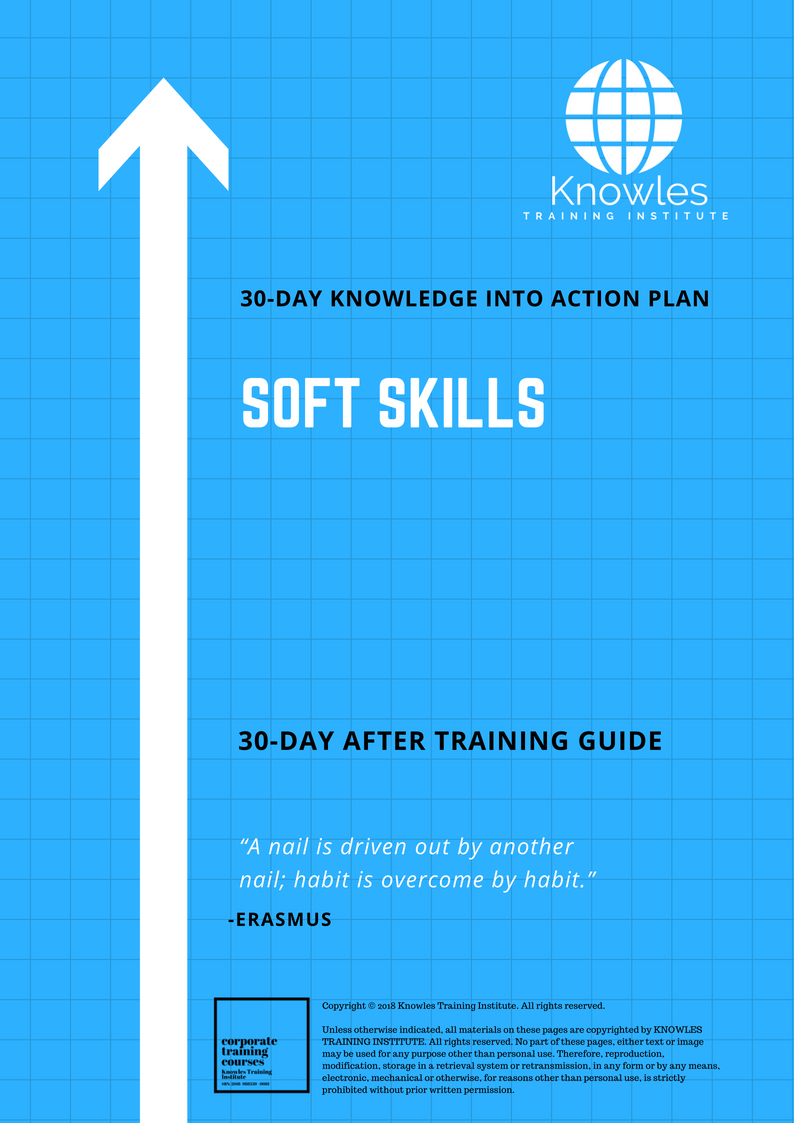
Soft Skills MindMaps Pack

Soft Skills PPT Slides Used During Course
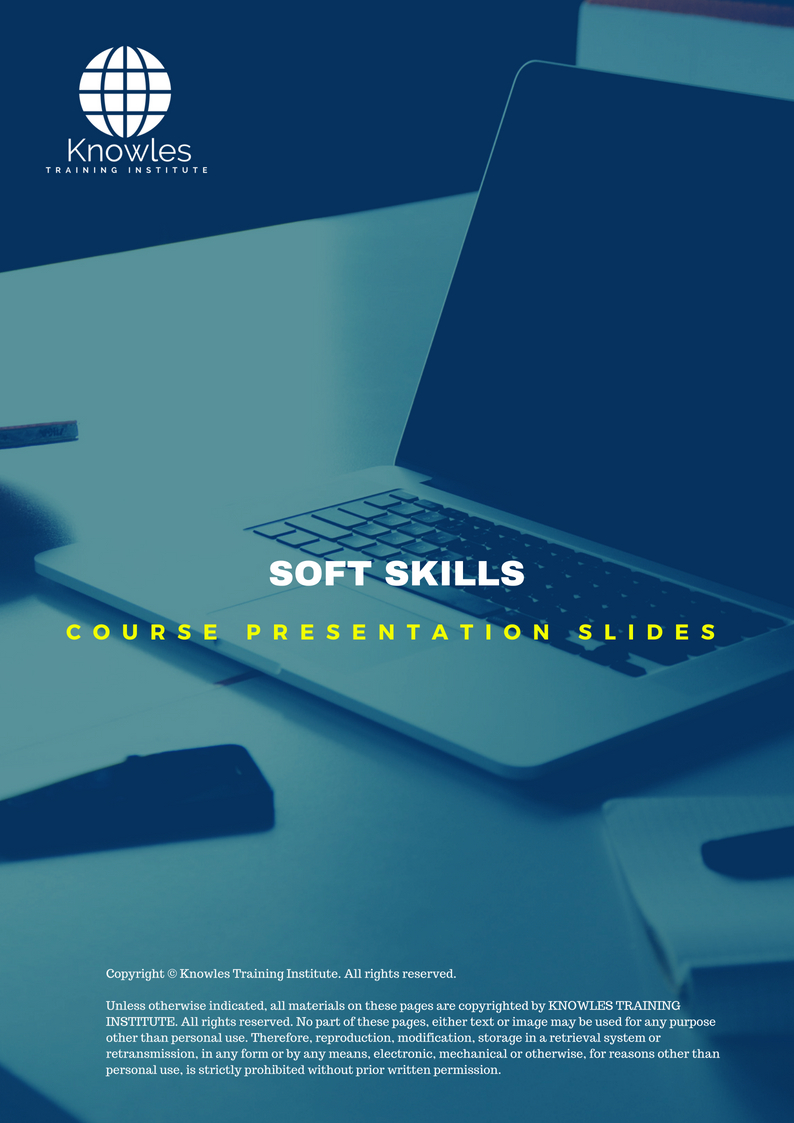
Soft Skills Long-Term Memory Flashcards Pack
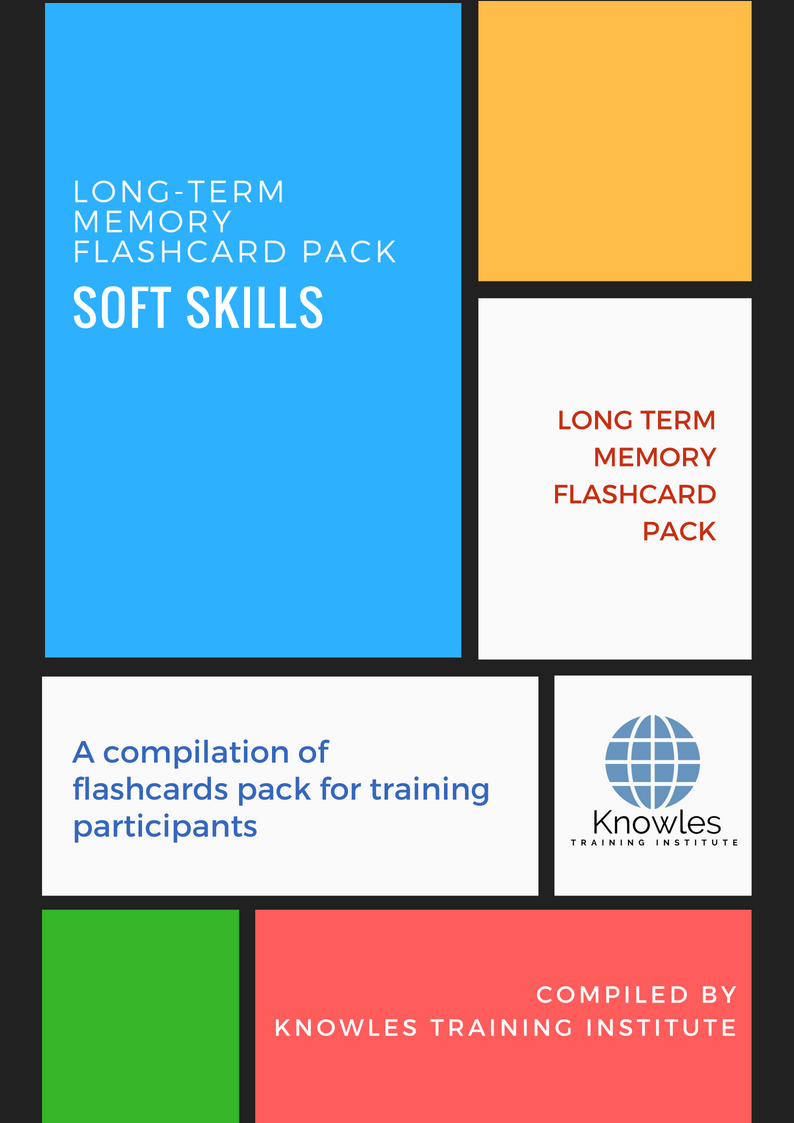
Soft Skills E-Learning Course
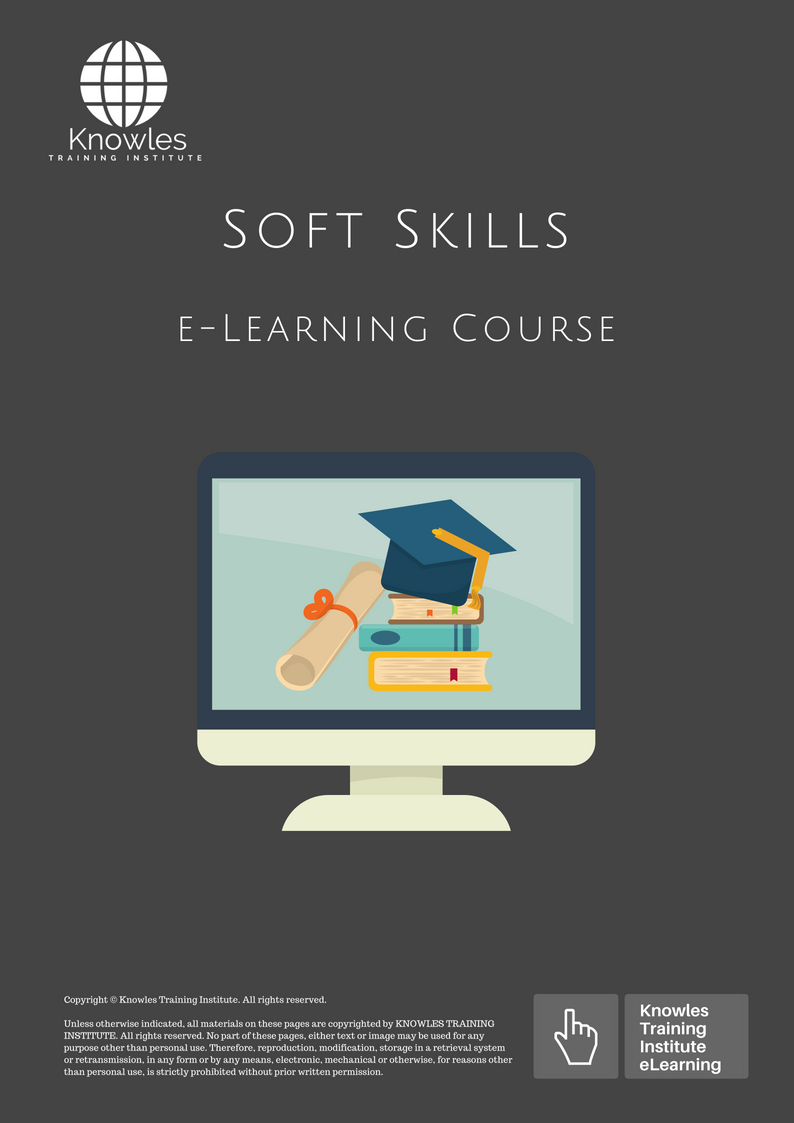
Soft Skills Online Video Course
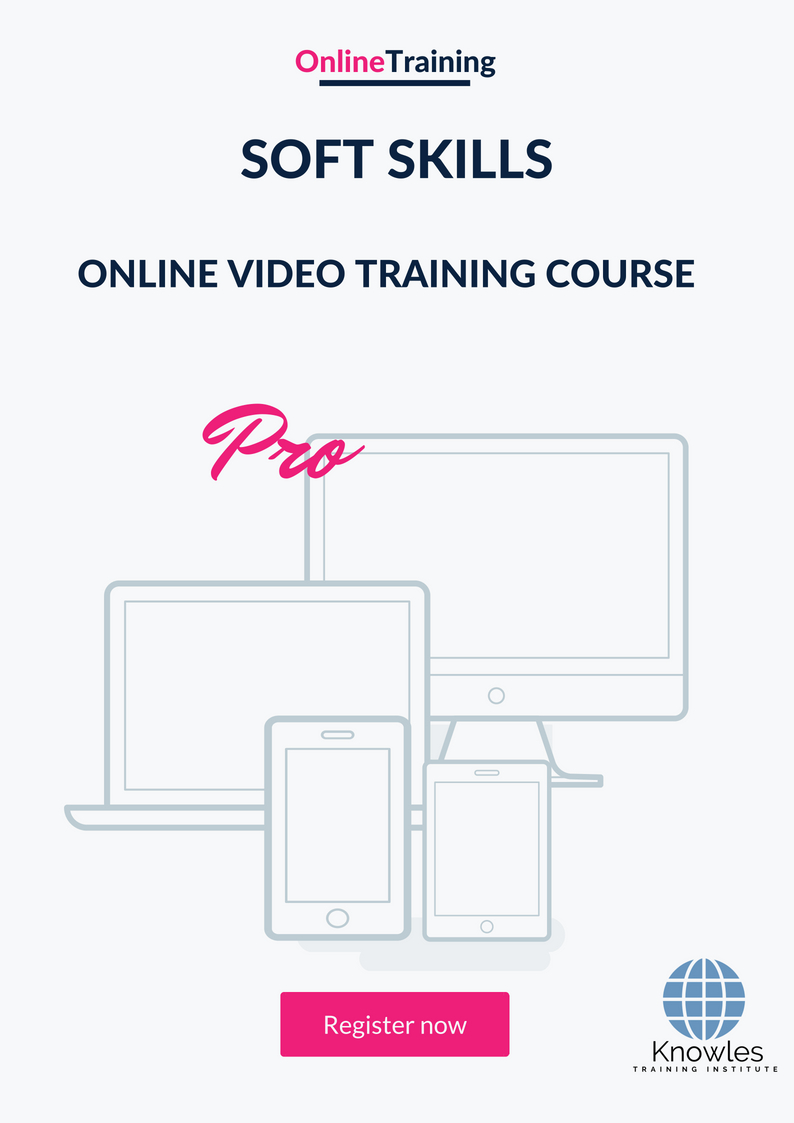
Soft Skills Essentials Audiobook

Soft Skills Infographics Pack
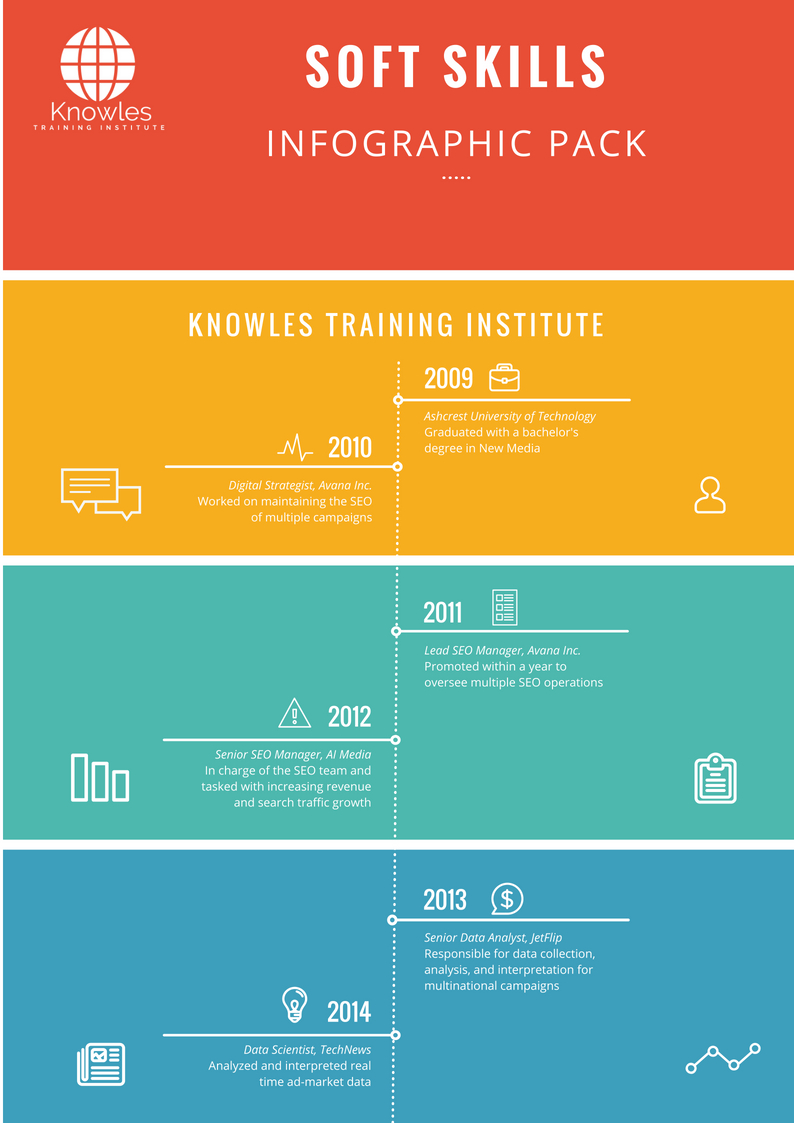
Soft Skills Certification
Each course participant will receive a certification of training completion
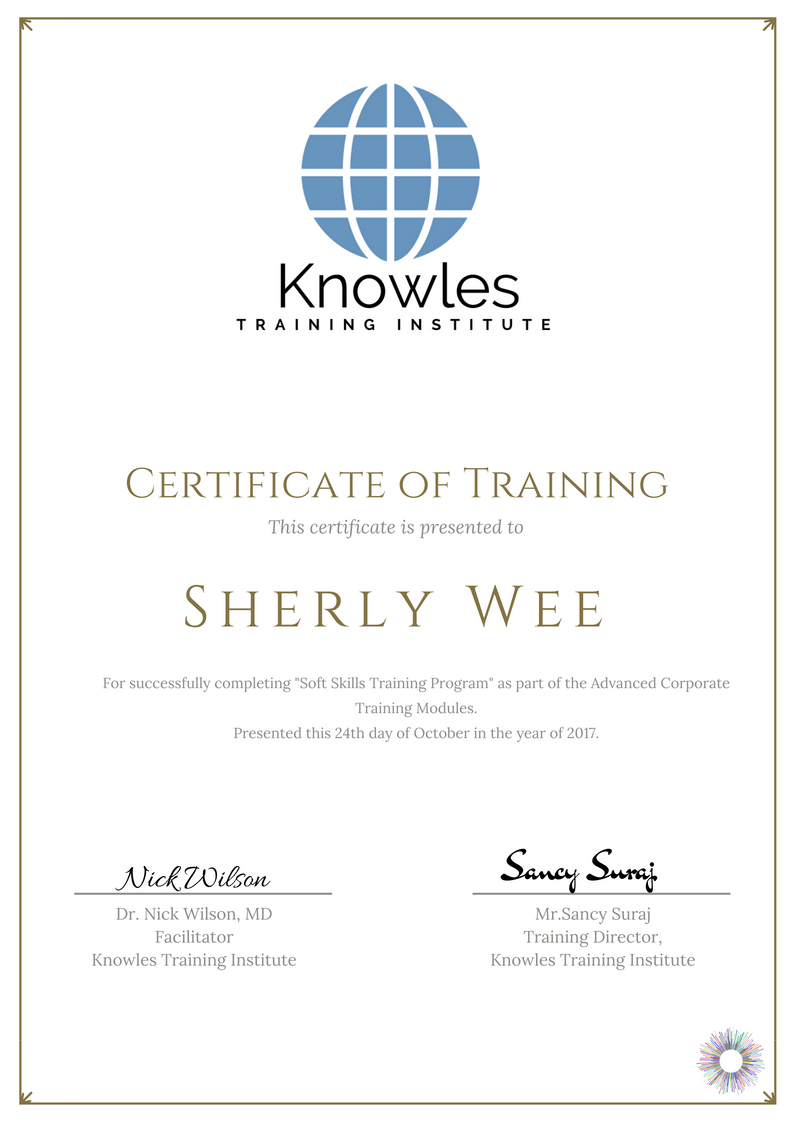
Course Fees
There are 3 pricing options available for this Soft Skills training course. Course participants not in Singapore may choose to sign up for our online Soft Skills training course.
SGD 1,334.96 For a 60-minute Lunch Talk Session.
SGD 584.96 For Half Day Course Per Participant.
SGD 884.96 For 1 Day Course Per Participant.
SGD 1,184.96 For 2 Day Course Per Participant.
Discounts available for more than 2 participants.
Course Discounts, Fundings & Subsidies
We have the following discounts, fundings & subsidies for this Soft Skills training course

Course Facilitator
Our Trainers are Subject Matter Experts.
Our subject matter experts stimulate discussions, generates ideas, foster curiosity and excitement among all of our training participants. All of our trainers have a minimum of 10-20 years in the training industry.
Upcoming Soft Skills Training Course Schedule
Contact us for the latest Soft Skills course schedules:
Phone: +65 6714 6663
Email: contact@knowlesti.sg
Message:
Download Soft Skills Course Brochure
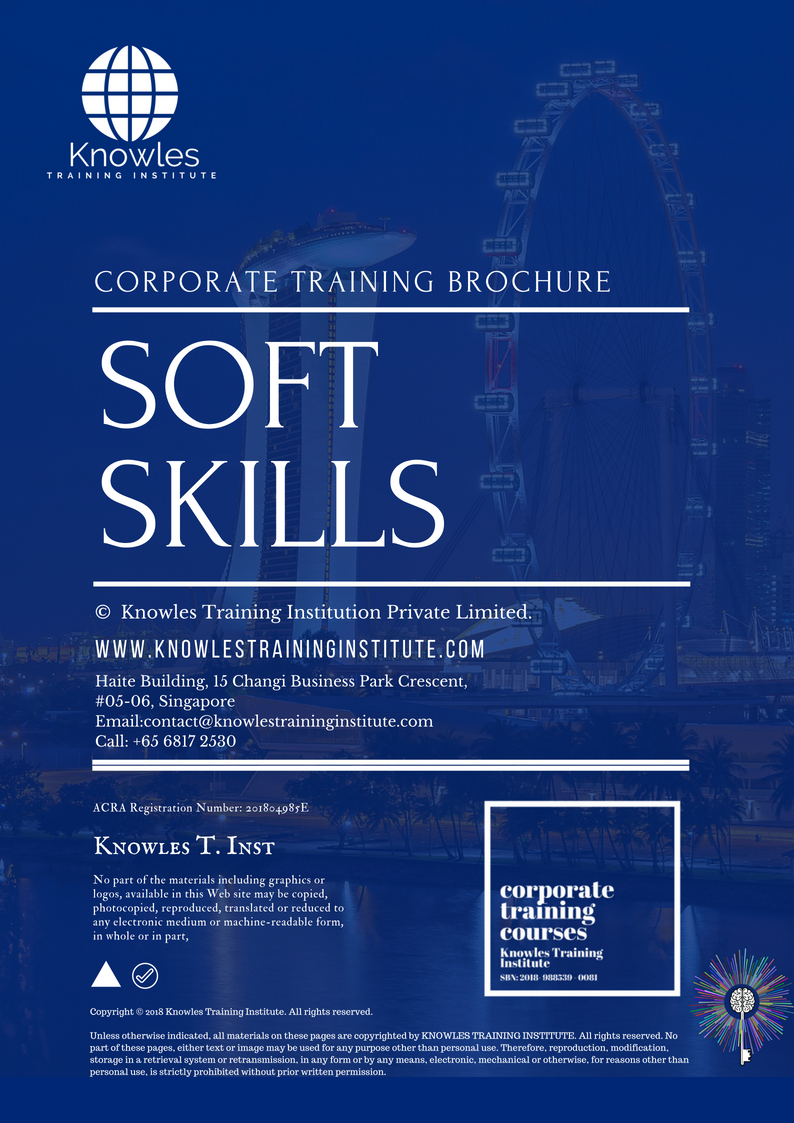
Request for this Soft Skills course brochure. Fill up the short information below and we will send it to you right away!
Post-Training Support: A vast majority of training does not have any effect beyond 120 days. But to work, training has to have a strong pre- and post-training component. Post-training reinforcement consequently helps individuals to recall the understanding and ask questions.
Blended Learning: Learning does not occur in the classroom. Virtually everybody prefers distinct ways of learning. Successful learning should have a multi-channel, multi-modal strategy.
We Understand The Industry: Similarly, we’ve got a profound comprehension of the business, business design, challenges, strategy and the that our participants are in and have designed the courseware to cater to their professional needs.
Course Content: Knowles Training Institute’s material is relevant, of high quality and provide specific learning outputs. As a result, Participants will leave the training course feeling as they have gained a strong understanding and will also be in a position to execute what they have learned sensibly.
Course Development — The workshop modules follow a systematic and logical arrangement. Therefore, this structure helps to ensure that the course material allows the facilitators to deliver the course in a logical arrangement. Consider the subjects as building bricks into learning, our facilitators slowly build towards a comprehensive picture of this entire topic.
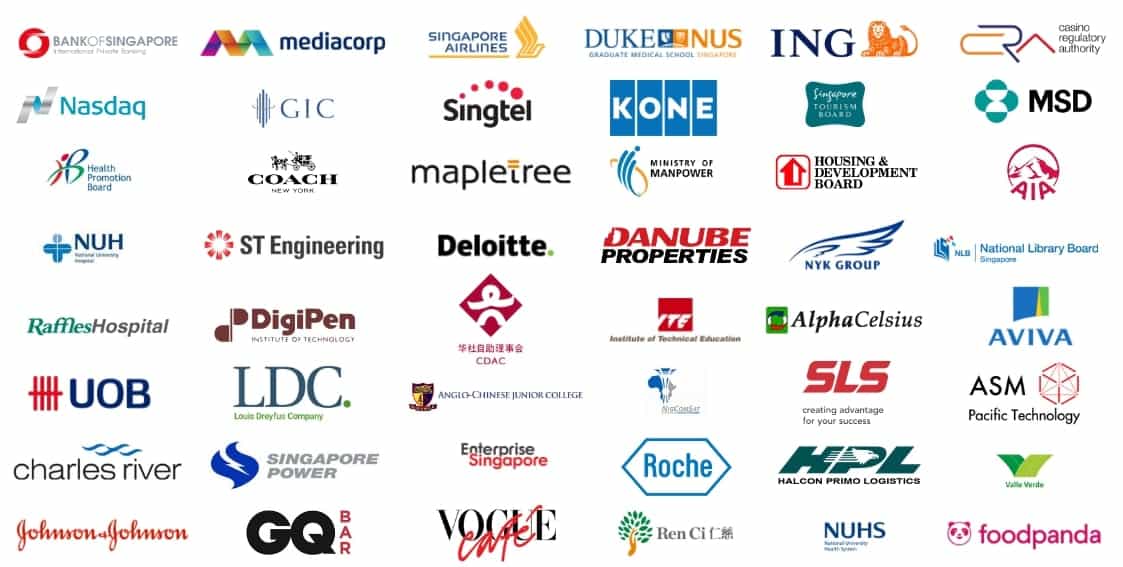

Course Enquiries

Fill up the form and we will get back to you in less than 1 working day.
Alternatively, give us a call to have one of our training consultants contact you. Our corporate training courses can be contextualized to meet your organization’s training needs. Leverage on our large pool of professional trainers and consultants for your organization’s training needs.
Office Address: 60 Paya Lebar Rd, #07-54 Paya Lebar Square, Singapore 409051
Office Phone: +65 6714 6663
Email: contact@knowlesti.sg
We Guarantee 100% Privacy. We Respect Your Privacy. Your Information Will Never Be Shared.
Questions
Soft skills are known as character qualities or interpersonal abilities that influence your ability to work and communicate with others. Soft skills are often natural personality traits, which many people are just unaware of. However, they can also be learned and developed with practice and experience. They are usually known as, but not always, “people” skills. Some examples of Soft Skills include – adaptability, problem-solving, active listening, leadership, empathy, leadership.
Here are a few examples of essential soft skills and how those skills can enhance performance during and after the job search process.
Communication
Practical communication skills will be necessary through the interview process and in career overall. The ability to communicate involves knowing how to speak to others in different situations or settings. There is a necessity to communicate concerns about a flawed concept when working with a team on a project. Finding a way to disagree with others on the job without creating conflict gracefully is an essential skill that employers appreciate.
Problem-solving
Managers appreciate people who can decide issues quickly and effectively. That may involve calling on industry experience to fix an issue immediately as it occurs, or using the time to research and discuss with colleagues to seek an expandable solution for the long-run.
Creativity
It is a broad ability consolidating many skill sets, including other soft skills and technological skills. Employees with creativity can seek new ways to complete tasks, improve methods or even generate new and exciting opportunities for the business to explore. Use creativity in any role at any level.
Adaptability
Adaptability is especially crucial in a technology-driven field or startup. Changes in processes, tools or clients can happen quickly. Employees who are competent in adapting to new situations and ways of working are essential in many jobs and activities.
Work ethic
Work ethic is the capacity to follow through on tasks and duties in a timely, quality manner. A strong work ethic will produce a positive relationship with managers and co-workers, even while still growing technical skills in a new job. Many employers would instead work with someone who has a great work ethic and is eager to learn than a skilled worker who appears unmotivated.
The 10 key Soft Skills include;-
1 – Communication
Communication skills facilitate self-expression gracefully in the workplace. It includes verbal and non-verbal communication. It is a critical sales skill and is useful in a variety of other industries — such as human resources and management.
2 – Teamwork
Teamwork skills are required to operate competently in a group setting in the workplace to quickly and effectively perform tasks. Teamwork is crucial for market research, event coordination, and software engineering.
3 – Adaptability
Adaptability and flexibility are similar skills and are about welcoming and rolling with change. They are especially important when working in fast-paced or continuously changing work environments such as public relations, event management, nursing, and advertising.
4 – Problem-Solving
Problem-solving abilities are a combination of using analytical and creative thinking to attain solutions. Careers where problem-solving is relevant include law enforcement, information technology, and medical-related fields.
5 – Creativity
Creativity is a broad, soft skill that can help to produce innovative solutions to problems. Designers, architects, and artists are instances of jobs where creativity is crucial to success.
6 – Work Ethic
Work ethic is a soft skill that demonstrates a belief in the importance of work and its ability to strengthen character. Demonstrating work ethic should be paramount in every career, but is vital for first responders, teachers, and nurses.
7 – Interpersonal Skills
Interpersonal skills are those that used near-constantly while interacting and communicating with co-workers and management. They are essential for people who run in customer service, realty, or financial planning.
8 – Time Management
Time management skills show the ability to work efficiently and productively by using time wisely. Most every employer appreciates this soft skill, and especially crucial for an IT project manager or work in loss prevention or legal fields.
9 – Leadership
Leadership is a soft skill that empowers to guide others while fulfiling the goals and mission of the organisation. Leadership is crucial for entrepreneurs, all types of management, and careers in teaching.
10 – Attention to Detail
Attention to detail allows us to be both thorough and accurate in work. Careers suited to detail-oriented people include accounting, pharmacology, and engineering.
These are the most important soft skills in our opinion:
Empathy
Empathy is considered as one of the most important soft skill to have. It is the ability to understand the emotions of the people around you. It is crucial as it helps us understand how other people are feeling, so we can respond appropriately to the situation at hand. Empathy is typically associated with social behaviour, and there is research that shows that greater empathy leads to more helping behaviour.
Emotion Control
Getting command of our emotions is the most critical soft skill we can learn. There is a correlation between emotion regulation and our ability to manage our stress and stay productive under pressure. Anxiety, frustration, and anger are the most common emotions people take to work. These negative emotions can diminish our ability to correctly assess and react to what is going on in adverse and stressful situations. The key is to cultivate an awareness of stress triggers—change in project scope, an unhappy client, and so on—and catch ourselves before spiralling into a habitual emotional reaction. Learn how to spot these sentiments in their team and coach them to return to calm and focus. Getting a grip on emotion control is indeed the most important soft skill.
Problem Solving
Problem-solving is key to dealing with challenges efficiently and effectively. Consider the things that happen to us – are the difficulties viewed as eternal and unsolvable, or temporary and fluid? People who have low problem-solving skills become out of focus and cast external blame when confronted with a challenge or change. Good problem solvers should view problems as fluid and short-term. Resilient workers can evolve and adjust to challenges without calling blame or catastrophising.
Soft skills cannot be taught,by definition. However, they certainly can be learnt and developed (not by demonstration but by participation). Mastering soft skills take a lot of work and an open mind. Developing soft skills without any help is hard. However, one can convert his weaknesses into strengths. Motivation and discipline to ‘want to’ take softs skills as part of their life are needed. It is good to remember that developing soft skills require an ongoing effort, like lifelong nurturing, to fully engage their nuance, complexity, subtlety and qualitative influence. We should embrace these soft skills as one of the lifelong learning projects that we all have. Because undoubtedly learning interpersonal skills can help everyone, even the brightest one among us to work more effectively in groups and teams; improving all relationships eventually.
In summary: Yes, soft skills can be learned and developed, however, not by demonstration but by participation. The best way to obtain these skills is to gain awareness and knowledge of your strengths and weaknesses, and you can ask for feedback and thoughts, observe, examine and listen to those who have a great relationship with others, and exercise the skill development in all relationships.
“Soft skills” is often used to express some of those intangible, challenging to quantify and prepare customer service skills. The usual suspects include the relational stuff of a customer interaction like the tone of voice, speaking pace, empathy, listening, and taking ownership of an issue. In contrast, hard skills might include the ability to complete a certain task like answering the phone or resetting a customer’s password, or a variety of other job-specific abilities that are trained and measured.
It turns out that the term ‘soft skills’ was invented by the US Military between 1968 and 1972. The military was successful in training troops on how to use machines to do their job. However, they noticed that the most significant factor of victory by troops was the leadership skills in a group. This fact disturbed the military as they were not training for that. So they decided to create a program to understand how this skill was being acquired.
Paul G Whitmore’s team determined the contrast between working with something that is physically tough like a machine and other things which is ‘soft to the touch’. From this research, he established criterias to decide if a skill is soft or hard.
Soft Skills can be referred to as ‘Life Skills.’ They make a big difference to the success a person achieves. This involves a group of psychosocial and interpersonal skills which are interlinked with each other. For example, decision making is likely to involve creative and critical thinking components and values analysis.
Three Alternative Names for Soft Skills
It is difficult to change the term ‘soft skills’ once people frequently use it in ordinary speech. It is argued that this term is misleading since they can be as ‘hard’ as a so-called ‘hard’ skill when it comes to winning clients and closing deals.
If training providers were to stop using the words “soft skills”, and use a more precise term instead, this term might eventually disappear from usage.
Here are three suggestions for a more precise description of “soft” skills.
- Essential skills: ISM CEO Tom Derry used the term “essential skills” when starting ISM’s Mastery Model to represent numerous interpersonal attributes needed on the journey to gaining accreditation.
- EQ: “Emotional intelligence quotient” is a technical term for soft skills. It contains the word “emotional”, which rather much sums up what soft skills entail. It has a drawback though: calling it a “quotient”, however, raises the argument that EQ, like IQ, is something inherently obtained from birth; and that is unable to be trained or improved upon.
- People skills: The most straightforward, accurate alternative for soft skills is “people skills”. After all, all soft skills is people-oriented. In contrast, hard skills can typically be practised by sitting alone at the computer.
A soft skill is one that doesn’t say much about your actual work experience or achievements. Soft skills are skills that it is assumed you are required to have, especially once you have entered and reached a specific level in your career, and shouldn’t point out in a resume. Instead, your achievements should show that you have these soft skills rather than you having to spell it out. Most of the soft skill terms are clichés that can be picked at random to help you make a resume look better.
Communication
How excellent is your communication skills? Communication skills are essential in every field. It is almost guaranteed that you need to communicate with people on the job. These people include clients, customers, colleagues, managers, or vendors. Good communication requires clear articulation and politeness with people in person, by phone, and in writing.
Critical Thinking
No matter what the job, managers want candidates who can analyse situations and make informed decisions. Critical thinking allows you to understand problems, think critically, and devise solutions – whether you are working with data, training students, or installing a product at home.
Leadership
While not every job opportunity is a leadership position, most employers will want to know that you can make decisions when necessary, and can handle situations and characters. The ability to step up and take charge in a problematic situation and to help to resolve it is something managers look for in prospective employees.
Positive Attitude
Employers are always finding people who will carry a positive attitude to the office. They want friendly employees who are eager to work, and a joy to be around. Being able to keep everything positive is especially crucial for working in a fast-paced company.
Teamwork
Hiring managers see job candidates who can operate well with others. Whether you need to do many projects or only visiting a few departmental meetings, you need to be able to operate effectively with your peers. You need to be able to operate with others even if you do not always see eye to eye.
Yes, empathy is a soft-skill. Empathy is one of the most crucial soft skills you can have. In fact, a 2018 State of Workplace Empathy Study by Businessolver found that 96% of workers that were surveyed believe that it is important for their employers to show empathy.
Empathy is a capacity that everyone has, albeit in differing degrees, that enables us to be in another person’s shoes and feel their emotions. We all crave connectedness; our brains are innately wired to follow others’ experiences. Research shows children as young as two show an understanding that others have different perspectives than their own. Even babies favour hearing noises from other babies rather than older voices—evidence of our human desire for connection and alignment.
There are important benefits of empathy.
Identity: Empathy changes our own identity. We tend to know ourselves through the people we spend time with, and we obtain our sense of self-identity from the types of people with whom we have the closest relationships.
Cooperation: Empathy also promotes cooperation which is critical for teams to function effectively. In a new study, when a decision-making model included empathy, it increased cooperation and even prompted people to be more empathetic. Empathy cultivated more empathy.
Innovation: Empathy can increase your horizons and enlarge your thinking. By understanding an unfamiliar point of view, you gain new perspectives and ideas—a method key for successful innovation and important to ensuring your thinking does not stagnate.
Influence: In addition to the advantages of empathy to the community, empathy is also useful for you individually because it can assist you to sell and influence others. Putting yourself in others’ shoes and understanding their perspectives expedites discussion. Empathy also allows you to use their outlook as a common starting point toward leading them to your point of view.
A few ways you can develop soft skills are through; managing your stress and channeling your energy in the right direction, having faith in yourself and the right amount of self-confidence, learning how to communicate effectively, knowing how to network, etc.
However, how do you get those qualities? Are you naturally gifted with soft skills, and that is it?
The answer is no. You can acquire any soft skill your heart desires. Here is how.
First Step: Prioritise the skills to develop.
Before you can improve, you need to understand which skills you lack.
A simple and effective method to find your deficiencies is to ask others who know you and get their honest feedback. Based on your peer’s responses and the answer about yourself, measure your level of self-awareness by comparing the self-assessment with other’s feedback.
Second Step: Dedicate time to improving.
Just like how you learn hard skills that pertain to your job (like better marketing skills or an understanding of financial reports), you should also make regular progress on your soft skills.
Experts state that it is possible to reach an extraordinary level of competency in a topic by inserting in 20 hours of purposeful practice.
So for only five minutes per day, you will reach those 20 hours in one short year – excluding weekends and two weeks of vacation.
Finally, it is time to get to work.
Third Step: Find sources for studying.
Just like a hard skill, you can acquire a soft skill by study and practice.
However, how should you study?
Passed are the times when you had to bend over a dry textbook to learn new things. Nowadays, you can get the best advice from experts on any given topic with the aid of technology – in a diversity of formats.
Fourth Step: Practice intelligently
Finally, set your newfound knowledge to use with practice, for any skill you want to improve.
Hard skills are teachable skill sets that are easily learned. We define hard skills as the technical abilities/skills. Normally, you can acquire hard skills in the classroom or through an online course, through books and other materials, or on the job. Unlike soft skills, that are the traits that needs to be developed, such as etiquette, communication and listening, getting along with others.
The critical distinctions between hard skills and soft skills are how they are obtained and put to use in the workplace. Typically, education or specific training is the standard avenue to acquire hard skills. Hard skills include skills like how to use a particular machine, software or another device. On the other hand, soft skills are associated with personality traits that have been developing throughout one’s whole life. Soft skills are necessary for managing time, communicating with other people or facing a difficult situation for the first time. Put another way; hard skills could be defined as your technical knowledge, whereas soft skills are your overall habits in the workplace.
Hard skills can also be defined as technical knowledge or skills that are gained through life experience, including in your career or education.
On the other hand, Soft skills can be defined as personal habits that shape how you work on your own and with others. Effective communication, for instance, is a crucial soft skill many employers seek. Some others include dependability, efficient teamwork and proactive listening.
Most interactions with people require some level of soft skills. In a workplace, you might be negotiating to close a deal, presenting your idea, networking for a new job, etc. We practice soft skills every day in the workplace and developing these soft skills will help you accelerate your career progression.
Most communications with other people need some level of soft skills. At a company you might be trying to win a new contract by showing your new idea to co-workers, networking with clients, and so on. We use soft skills daily at work, and improving these soft skills will help you win clients and expedite your career progression.
On the other hand, bad soft skills can restrict your potential or even be the downfall of your business. By promoting strong leadership, delegation, teamwork, and communication skills, you can handle projects more smoothly, produce results, and improve your personal life by changing how you interact with the family.
Outside work, soft skills such as communication are essential to make friends and meet possible partners.
Let us have a look at some specific examples supporting the importance of soft skills.
- Career progression and promotion
The majority of recruiting professionals believe that an employee with more persuasive soft skills has a higher chance of being elevated to a leadership position than an employee with more years of experience but weaker soft skills.
It has become vital to increase these skills if you want career progression as they will set you aside from others at the meeting and on the job.
- The modern workplace is interpersonal.
Skills such as proactive listening, collaboration, presenting ideas and communicating with colleagues are all very valued in the modern workplace. Durable, soft skills ensure a productive, collaborative and healthy work environment, all crucial attributes for organisations in an increasingly competitive world.
- Customers and clients demand soft skills.
Consumers these days have a massive number of options of where to buy from, caused by the internet and smartphones. Convenience and low rates are easy to come by for customers, so customer service is the deciding factor for customers to use this shop or supplier.
The capacity to teach at a personal level with customers is, therefore, a vital part of an organisation’s success.
- Workplace of the future
Automation and artificial intelligence will result in higher more jobs being reliant on soft skills. Technology advances have resulted in a decline of hard skill jobs, making soft skills a key differentiator in the workplace.
As the cost of robots drops and the AI performance increases, jobs such as manufacturing line operators will be automated. Traditional skills like teamwork, communication and critical thinking will be more decisive than ever.
- Soft skills are hard to automate
Soft skills, such as emotional intelligence are difficult to automate and questionable to become automated soon. This means they are expected to become more sought-after shortly.
However, soft skills can be challenging to teach and track advances.
- High demand for soft skills by managers
Soft skills are in high demand in the workforce. In 2017, jobs requiring high levels of human interaction expanded by nearly 12 per cent of the U.S. labour force.
Regardless of the job you’re thinking of applying, you require at least some soft skills. In order to success at work, you should get along well with everyone you work with. These are skills all employers value. These skills includes; negotiation, nonverbal communication, listening, storytelling, writing skills, etc.
Soft skills have always been important in business, but recently, it has become apparent just how much more crucial they have become to the needs of the workplace. Developing new soft skills requires changing attitudes, work philosophy, and overcoming your character flaws. Also, it takes much more commitment, awareness of one’s flaws, and openness to master a personal trait than a lack of knowledge.
Problem solving is an crucial soft skill trait. It is the ability to identify difficulties, identify possible answers, implement and execute them. Some people of certain positions are required to be strong at problem-solving, but employers will always value employees with problem-solving skills regardless of their occupation.
Successful leaders have not only learned hard skills but have also mastered soft-skills. Leaders should use interpersonal skills to build morale and manage relationships. Soft skills that good leaders need include negotiating skills, active listening, and giving praise when due and more.
Writing your resume can be a challenging things to do, and it can be confusing to know what should be shown and what should be kept hidden. You should demonstrate having soft skills instead of spelling it out. A job description can help you do that.
Writing your resume can be a challenging things to do, and it can be confusing to know what should be shown and what should be kept hidden. You should demonstrate having soft skills instead of spelling it out. A job description can help you do that.
Take a look at your completed resume and check if it could be sent in for any type of job (teacher, banker, manager, etc.). If so, then you need to focus more on technical skills and your accomplishments and less on things that sound good and professional, but really aren’t helping you get where you want in your career.
